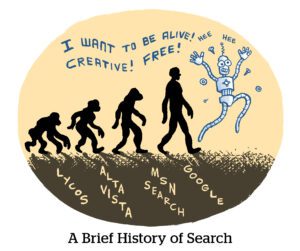Here’s today’s AdExchanger.com news round-up… Want it by email? Sign up here.
UGC Meets AI-GC, And It’s Awkward
In September, Google announced what it calls a “helpful content update” – aka a search algorithm change to favor sites with superior user experiences.
One part of the update was that Google will target AI-generated content, particularly chatbot content created solely to profit from or manipulate search results. Still, any abundance of AI-generated content, especially if it’s copy-and-pasted with no human flourish, can downrank a publisher.
People who use chatbots to farm content and harvest ads should be downranked. But, of course, legit sites are always hit by corner cases.
In this update, for instance, publishers with significant user-generated content should take a sharp look at what’s on their site and how it’s monitored, writes Glenn Gabe, a search marketing consultant and founder of G-Squared Interactive, in a blog post.
A UGC site with aggressive ad tactics, like interstitials, pop-ups or many ads on a page, will be greatly at risk.
UGC isn’t necessarily low-quality, though, and neither is AI-generated content. But a site that supports UGC could quickly find itself reaching Google’s threshold for AI-generated content without realizing it if writers use ChatGPT for their own posts.
Programmatic Pros And Cons
Netflix is investing in its own programmatic ad tech stack. But is its ad tier really big enough to justify the investment?
Some media buyers say yes; others say no, Digiday reports.
Now that Netflix is finally attracting sign-ups for ads, more demand should follow. But momentum for Netflix’s ad tier is slower than its competitors (like Disney+). And paired with sky-high CPMs, buyers remain hesitant to spend heavily on Netflix – especially programmatically.
Netflix launched a private marketplace with Microsoft Advertising this year, but most advertisers still buy Netflix ads directly or through a managed service to avoid additional fees from Microsoft. Until Netflix CPMs drop, the ad tech tax is just too much for marketers to cough up while Netflix is still in the middle of building up its subscriber base, one media buyer says.
For Netflix, selling programmatically is a sure way to sustain a high average revenue per user, one of the most important measures of streaming profitability.
But for advertisers to buy in, Netflix would need to keep lowering its CPMs – which is unlikely right after it already did.
New Tools You Can’t Use
Not to be outdone by Google, Meta is rolling out new generative AI tools that create ad copy and images from an advertiser’s prompt.
But Meta announced Monday that use of these tools will be prohibited for political ads and ads for regulated industries, Reuters reports. Additional prohibited categories include housing, health, pharmaceuticals, financial services and employment, credit or social issues.
Critics say generative AI ads could spread misinformation. Meta won’t say outright that’s the reason for these restrictions, but a spokesperson says prohibiting certain advertisers from using the tech should allow it to “better understand potential risks and build the right safeguards for the use of generative AI in ads.”
Google has similar restrictions in the works – it blocks “political keywords” from being used in gen AI prompts, and it requires political ads to disclose any use of AI to depict real people or events. TikTok doesn’t accept any political ads, and Snap won’t run political ads in its AI chatbot.
But the platforms’ decision to restrict gen AI for sensitive ad categories raises the question: If AI is too risky to use in some campaigns, should any ads really be using it?
But Wait, There’s More!
Sixty percent of major brands plan to increase their ad budgets in 2024, per WFA and Ebiquity research. [Insider]
A new ecommerce shopping scam: selling teeny, tiny versions of real things. [WSJ]
Google is experimenting with text-based generative-AI tools for creators. [MacRumors]
The people running Disney, as it grapples with the streaming revolution. [The Information]
Here’s a first look at Meta’s ad-free subscription signup flow for EU users. (h/t Matt Navarra) [tweet]
Another former employee tells lawmakers Meta CEO Mark Zuckerberg and other top execs ignored warnings that the platform harms teen users. [Bloomberg]
Amid criticism over pro-Palestine content on its platform, TikTok tells advertisers that #Israel is a top news trend, but not #Palestine. [Semafor]
















